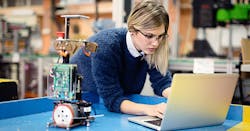Companies Hope STEM Programs Will Take Root and Flourish
The message was heard loud and clear: We need more STEM workers and we need them now. Students are abandoning Shakespeare for STEM, universities are providing real-world learning experiences and companies are offering paths to free education.
Upon discovering that degrees in English literature are not leading to jobs, students are marching over to the computer labs. The share of bachelor’s degree holders in the U.S. age 25 and over who majored in computers, math or statistics rose to 47% last year from 4.2% in 2009—an increase of nearly 1 million students over the period.
And at some universities they don’t have to wander far to apply what they are learning in the classroom. For example, the Advanced Manufacturing Partnership Laboratory located in Grand Rapids, Mich., on the Western Michigan University (WMU) campus, is stocked with 3-D printers and scanners, a CAD/CAM lab, plasma cutter, laser cutter, welding station, metrology equipment and prototyping tools.
The lab combines prototyping, training and small-scale manufacturing with the opportunity for individuals to earn college credits to be used toward a degree or certification. And beginning in January, WMU will offer courses for a certificate program in integrated design and manufacturing.
In addition, manufacturing engineering technology, engineering design technology and engineering management technology courses will be offered at the facility for students enrolled in WMU’s ABET-accredited four-year engineering technology degree program.
The city has high hopes for the students when they graduate. “In addition to developing a skilled workforce, the AMP Lab has the potential to provide other important services to our region,” says John C. Kennedy, president of Autocam Medical, based in Grand Rapids. “This facility and its students, led by engineering faculty and graduate students, can help local inventors prototype projects.”
Corporations are doing their part as well. IBM for example created a program called Pathways in Technology Early College High Schools. It began in 2011 with one school as the company was looking to bring more students into the STEM pipeline. Currently there are 100 schools that participate in this program.
Students can enroll in the six-year program, which begins in high school, and earn both a high school and an associate’s degree in a science, tech, engineering or math-related field. The schools map skills that employers value into the curriculum, preparing P-TECH graduates to enter the workforce after graduation.
To ensure that students can find jobs in their field, the program is supported by 400 business partners that work directly with 79 schools across the U.S. The business partners ensure that students are career-ready by providing mentoring, site visits and paid internships.
In addition to filling the many STEM jobs in the market today, P-TECH is also helping these graduates move to “new collar” jobs which can range from associate analyst to digital design developer.
In addition to efforts at the university level, there are technical programs as well.
The shortage of qualified automotive technicians drove Mercedes-Benz USA to expand one its technician training and development programs. The luxury automotive manufacturer this summer announced a new program in association with Jefferson Community & Technical College (JCTC) in Louisville, Ky.
The auto training shop program, Mercedes-Benz Accelerate, is the first-of-its-kind in the state. It prepares students to become a level one Mercedes-Benz Certified Systems Technician in just three semesters. Students will train on Mercedes-Benz vehicles, intern at a Mercedes-Benz dealership and have the opportunity to gain full-time employment after completing the program.
Across the range of jobs and levels of education, opportunities are being offered to students to help them choose STEM as their career. And let’s hope they can find some time for Shakespeare.
